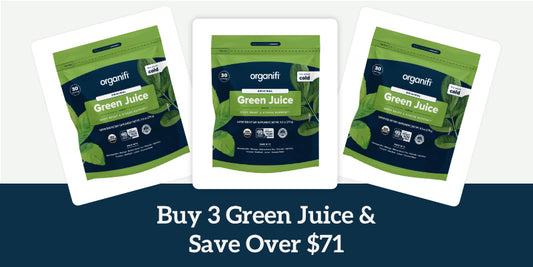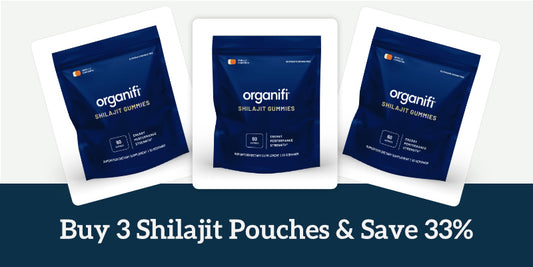Winter is coming, so what is rosehip good for?
In the colder months, skincare is often relegated to moisturizing lotions. And that’s not necessarily a bad thing, lotions and moisturizers could indeed be an effective way to keep your skin radiant, but they’re an external solution to an internal issue.
Meaning, you can’t really replace nutrition and healthy habits with skincare products; if you’re not hydrating properly, missing vitamins, or not getting enough rest - your skin will show it. Whether you’re spending hundreds of dollars on fancy face creams or not.
Which, again, begs the question: what is rosehip good for? We know, rosehip is not the first thing that comes to mind when you’re thinking of winter skincare, but it may actually be more helpful than you think:
Rosehip is a natural source of moisture that also packs 80X more antioxidants than lemons.
There are many things rosehip is good for, like boosting the immune system, acting as an antibacterial, potentially fading scars, and even supporting healthy bowel movements.
But in winter, it could be a mighty tool against the elements that supports your skin’s health from the inside out.
Truthfully, it may help year-round but, we’re here to give you the top 7 reasons you need rosehip this winter, what rosehip is good for specifically (think dark circles), how to get it, and how to creatively incorporate it in your self-care routine.
What Winter Does to Your Skin
We’re often more concerned with what summer does to our skin than what winter does; in summer you can quickly feel the dehydration… in winter? Not so much.
There are sneaky ways in which winter may wreak havoc on your skin!
Just because the sun is not shining, doesn’t mean you’re not exposed to the same (and sometimes worse) conditions.
Your body goes through a lot of environmental changes as you move through spaces, and your skin is affected by them just as much as if it were soaked in sunscreen, sea salt, or chlorine. Regardless of your skin type - oily, dry, or mixed- winter will likely affect you. In fact:
Many of our favorite ways to keep warm zap moisture out of the skin.
Hot showers, sitting by the fire eating smores, indoor heating, and windy intersections all have one thing in common - they dry you out. Making skin scaly, ashy, itchy, or even irritated, and accelerating the aging process.
Fortunately, it’s not all bad, nor inescapable; there’s no need to despair.
A few adjustments to your self-care routine, a bit of awareness, some conscious eating, and learning what rosehip is good for in each scenario could help you avoid most of this dehydration.
Why You Need Rosehip This Winter
To keep your skin radiant with a natural healthy glow during winter you have to approach hydration differently.
Sure, the idea of hot tea sounds marvelous when the temperatures are dropping outside, but knowing what food and drinks are doing to your body can help you avoid more dehydrating factors. That’s where rosehip steps in.
First things first:
Rosehip is not just a topical oil, it’s also an edible plant.
Rosehip and rosehip oil come from pressing the fruit and seeds of the rose plant, mostly derived from the Rosa Canina bush. There over 100 species, Rosa Canina is followed in antioxidant levels, fatty acids, and phenolic nutrients by the Rosa Pouzinii, Rosa Corymbifera, and Rosa Glauca types.
Research shows that the rosehip is good for the antioxidant defenses in the body in addition to having skin-replenishing nutrients with therapeutic applications both in topical form and ingested.
So, what is rosehip good for in winter? Hydration, naturally:
Rosehip contains highly hydrating fatty acids, potent antioxidants, and vitamins:
- Omega 6
- Linoleic and linolenic fatty acids
- Ascorbic Acid
- Vitamin C (80X more than lemons)
- Vitamin A
- Vitamin E
- Vitamin B
- Carotenoids
- More!
The high concentrations of Vitamin C, A, and E in addition to the skin moisturizing fatty acids help your skin stay moisturized from the inside, supporting healthy skin cell function, elasticity, firmness, regeneration, and suppleness.
7 Reasons to Try Rosehip this Winter:
- It’s full of antioxidants that may support healthy young-looking skin. In this study, rosehip showed more antioxidant activity than chokeberry, hawthorn, blackcurrant, blueberry, and rowanberry.
- Could keep infections away, including skin rashes, by strengthening the immune system with its remarkable Vitamin C power.
- May reduce inflammation, as noted in this osteoarthritis study. This could also help skin inflammation.
- It could support weight loss. According to research 100mg/day could reduce abdominal subcutaneous fat in 12 weeks.
- A growing body of evidence suggests that rosehip oil could reduce the appearance of wrinkles, this may be connected to its Vitamin A, astaxanthin, and antioxidant content that prevent collagen breakdown.
- Might boost collagen production, in addition to keeping existing collagen from breaking down.
- It could help your body protect itself against sun damage with its high Vitamins A, C, and E content.
Now that you know what rosehip is good for (healthy skin!) use these creative ways to incorporate it in your health, wellness, and self-care routines this winter.
7 Creative Ways to Use Rosehip in Winter
#1 Add It To Your Diffuser or Humidifier
A humidifier is the best way to go when you’re trying to get more moisture in your home or work environment; however, a diffuser works just as well. Both allow you to add a few drops of essential oil into the base water and then spread it around the room.
What is rosehip good for in a diffuser or humidifier? Because of its oily nature, it helps sustain moisture in the air, helps protect your skin (it absorbs everything) and may even help prevent sinus infections.
#2 Get It in Soap Form
Hot showers could be swapped for warm showers if you want to make sure less of your natural body oil is lost per shower.
However, given that rosehip is good for natural hydration and skin elasticity getting it in soap form or adding a few drops to your liquid soap could help trap natural moisture that is otherwise lost to harsh soaps and hot water.
What is rosehip good for in the shower? Direct skin hydration, gentle cleansing, and natural body oil protection. It may over time help you stay moisturized post-shower.
#3 Swap Your Tea for Rosehip
You can find rosehip tea, dried rosehip, or rosehip powder and drink it up. Switching your green or black tea, both diuretics that promote water loss, for a rosehip drink or infusion could help you stay warm and protect your skin at the same time. Its delicate, tart-sweet flavor is also perfect for winter!
What is rosehip good for as a drink? The immune system and your skin. Research shows that consuming a rosehip powder supplement may help reduce the appearance of wrinkles, add skin elasticity, and get more moisture. You could get it in our collagen boosting blend, Organifi Glow along with other 13 skin-loving ingredients.
#4 Modify Your Facial Skin Care Routine
During the winter months, choose creamier cleansers and avoid astringent toners. You can use rosehip oil on your face directly or mixed into your moisturizer. Afraid of acne and oily skin? The oil and moisturizer might not be the culprits; stripping all the oil from your face just forces you to make more.
A single drop of rosehip oil could help you hydrate the drier areas if you use a gentle cleanser. Tea tree oil could be applied sparingly on breakouts or excessively oily areas.
What is rosehip good for here? Balancing your natural oil production with its distinctive skin-maintaining properties. The key is to use very little, enough to hydrate the skin and absorb it within three to five minutes tops.
#5 Use it in Your Lip Balm
Almost everyone gets chapped lips during the winter, you can help your lips stay plump and terse adding 1-3 drops of rosehip oil to your lip balm or applying one directly on your lips. If it’s pure, it should not taste funny and it would be safe to ingest.
What is rosehip good for when used on lips? Rosehip is good for your lips because it source of hydration is natural and gentle.
#6 Add it to Soups and Salads
Rosehip powder and dried rose hips may be available at your local health food store if you find them, add them to soups and salads to boost their antioxidant powers and give you extra hydration from the inside. You could also add it warm drinks, like a healthy hot cocoa alternative - it likely won’t alter the flavor.
What is rosehip good for in soups and salads? Antioxidant power! The best way to get rosehip antioxidants to fight wrinkles, dryness, and oxidative stress, is to eat it. Most antioxidants lose their power when exposed to the elements, which is why the cosmetic application isn’t always effective. Try this rosehip dressing by best of Raw and Superfood.
#7 Massage it Into Nails and Scalp
Massage your nails with a few drops of rosehip oil to help protect them from breakage. To boost their growth, consume it in foods or supplements as it is a natural way to support collagen production.
What is rosehip good for when growing hair and nails? Vitamin C and fatty acid absorption. These two vital elements are necessary for healthy nails and hair to grow, try this DIY scalp tonic with rosehip and lavender by Auracacia to see how your body responds.
Bottom Line:
Rosehip is a powerful antioxidant and highly hydrating natural superfood. When added to both your diet and your beauty routine it could help you get the look and feel you want year-round in a sustainable way.
If you liked these 7X7 reasons you need rosehip and how to get it - share with a friend! We’re in this together.




